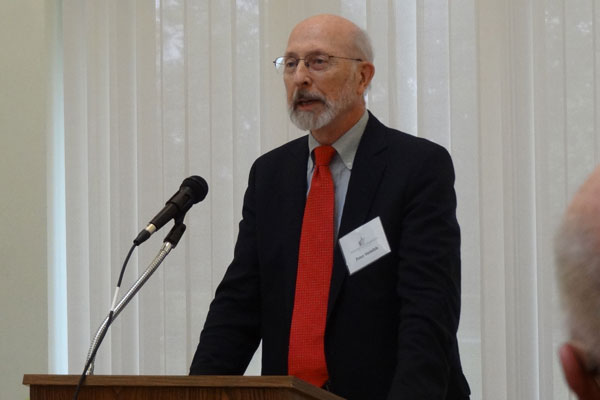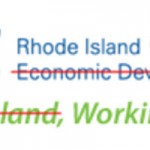Portsmouth Institute 2013 Conference: “Catholicism and the American Experience,” Day 1, Peter Steinfels
The afternoon of the Portsmouth Institute‘s first day, this year, opened with Peter Steinfels, who has been (among a number of notable things) a religion correspondent of the New York Times and editor of Commonweal magazine. Familiarity with either publication will leave one unsurprised to see him described, here, as a liberal Catholic.
What that means (or can mean) is an interesting subject. Introducing Steinfels, Right Rev. Dom Matthew Stark, one of the Portsmouth Abbey monks, described Commonweal as a notable holdout among liberal Catholic publications in still exhibiting the “old love of the Church.”
Of course, that phrase applied to Steinfels’s talk would require further description of “old” and definition of what exactly it is about the Church that the liberal Catholics love. In the phrasing that Steinfels himself used, what is the “Catholic identity” that he continues to believe to be important?
A conservative (implying either political or religious point of view) might infer the liberal’s love to be that of some forms and rituals — the beautiful language of some psalms rather than the harder instructions of the Catechism; the appreciation of traditional ceremonies rather than the traditionalist content of the homily. The response to that definition of identity would be that both the forms and rituals as well as the long-evolved teachings of the tradition and structure of the hierarchy grow from the same basic religious principles that make one a Catholic.
The conservative might further opine that religious liberalism shares with political liberalism the unworkable vagueness that there must be some way to hold on to that which is valuable in a social structure without the contentiousness that arises when sincere, possibly well-meaning people forcefully disagree. Steinfels emphasized that he is “uneasy, uneasy, uneasy” with what he sees as sweeping generalizations and adversarial stances within the Church in response to a changing society.
In that, he no doubt has a point. We should be “uneasy, uneasy, uneasy” when we stand with assertions that increasing numbers of people tell us are incorrect and perhaps even morally wrong, but that’s a mandate for reflection and verification of principle, not for adjustment. If we start from the feeling of uneasiness as the bright red flag that must be lowered, human nature leads us to be more likely to blame the abstract principles of faith rather than our own weaknesses and those of the people with whom we’d like to form communities.
Such debate leads always to where Steinfels took it when he suggested that, if the Church had not been “reactionary” during the period of the Enlightenment and the development of democracy, it would have “won that battle” and “wouldn’t be fighting now” with modernity. How that ostensible victory would have manifested in those actual years on the calendar isn’t as clear as some might take it to be. We tend to forget, from our current standpoint, that the Enlightenment and democracy were once radical ideas, not the well honed concepts we learn today. What would it have meant for the Church to charge along with the French Revolution?
The only result that can be lasting during a radical ideology’s onslaught is capitulation.
Here a metaphor could helpfully be applied: a stone that stands against the rising tides will forever be resisting it, as the tide wears down its sharper edges; a log that flows along with the tide will not only lose its starting point, but be rotted rather than polished.
A religion that is set in something larger beneath the surface will never cease to battle the ebbs and flows of human history.
But, Steinfels suggests, the profound shifts in our society, notably with respect to women and sexual morality, are “irreversible.” Social institutions like science, politics, and economics have “emancipated” themselves from religious thinking. The Catholic Supreme Court Justices have all sworn that their judgments will follow from the content of the law, not the moral teachings of their Church (much less the judgments of its hierarchy). The challenge, as Steinfels sees it, is to promulgate religious faith in a society that allows for “religion-free zones.”
Note what has happened, here, if we return to my metaphor: Science, politics, and economics become the unmovable stones; social mores become points along the stream to which we can never return once passed; and religion becomes, at best, a raft to keep us from drowning in meaninglessness.
What is the problem with that? Well, it abandons the notion that faith is another way of knowing something real about the natural world. It makes religion’s claims about morality and about the sharp edges of other modes of knowledge like science and economics into statements of aesthetic preference.
And ultimately it reinforces the cultural tide in its incessant wearing down of even those supposedly rock-solid, natural areas of intellectual pursuit until even they conform to the animal flow of human desire. Better to see religion as the riverbed itself, guiding the direction of society.
In a way, Steinfels agrees with Robert George. He’s saying that the Church shouldn’t be set up as an adversary to progress, but should be presented as a means of making our lives richer — less of an alternative lifestyle than a lifestyle enhancer.
But some things just cannot be squared with tradition and/or scripture, meaning that something has to give. Either some trappings of modern life must be rejected, or some holdings of the Church, often those arguably essential to anything rightfully called “identity,” must be cast aside. Whereas George was posing the enhancement as proof of religion’s natural good, Steinfels seems to present the enhancement as the natural good itself.
With that formulation, we should not be surprised when the painful difficulty of resisting urges of the body and urgings of corrupting voices leads people to conclude that even the forms and rituals of religion are neither enhancing nor good.
The talk is well worth watching (and interpreting) for yourself:




